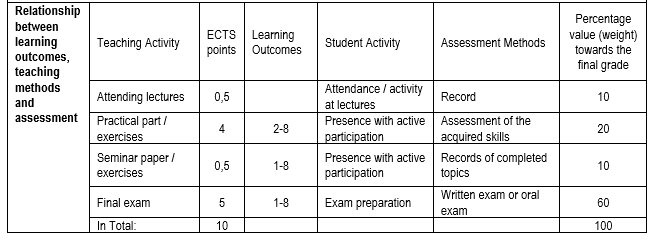The goal is to acquire knowledge, skills and develop independence and accountability in basic health care of patients as well as competencies that are important in nursing care.
History of nursing
Definition of health care, theory and conceptual models
Factors that influence health care: social, cultural, spiritual, economic and political
Organisation models of nursing care in primary, secondary, tertiary health protection
Nursing terminology
General procedures in preventing infections
Basic human needs and their relationship in regards to health care
Breathing – assessment of patient condition, impact of factors on fulfilling the needs to breath, interventions of a nursing bachelor
Food and fluid intake – assessment of patient condition (standards, nutritive needs, habits, lack of food and fluid intake) feeding, artificial ways of nutrition
Elimination of waste material – assessment of elimination functions of patient – features of excretions – normal and pathological
Care for patient who cannot fulfil the need of elimination (obstipation, diarrhoea, incontinence of stool/urine. Clyster. Catheterisation. Taking excretion samples for laboratory examinations
Mobility - assessment of patient condition; impact of limited mobility on the body.
Prevention of complications due to prolonged bed rest
Sleep and rest – assessment of condition, habits, conditions that will ensure patient’s sleep
Dress and undress - assessment of patient condition and intervention of nursing bachelor
Body temperature – assessment and measuring, nursing care for patient with high fever, application of procedures that will support physiological processes and ensure desired external factors
Personal hygiene, protection of skin and mucosa – assessment of skin condition, mucosa, help with fulfilling needs
Patient safety – assessment and protection from mechanical injuries, physical risks, hospital-acquired infections, violence
Communication with others to express needs and feelings
Fulfilling religious needs – assessment for life in accordance with their religion
Work, productive activity and recreation – assessment, habits, adjustment to patient’s abilities
Learning – assessment and patient’s abilities, patient education and education evaluation
Documentation in health care
Application of medication
Obavezna literatura:
- Fučkar G. Proces zdravstvene njege. Zagreb: Medicinski fakultet Sveučilišta u Zagrebu; 1992.
- Henderson V. Osnovna načela zdravstvene njege. Zagreb: HUSE i HUMS; 1994.
- Barać, I. Osnove zdravstvene njege. (radni listovi) Osijek: Medicinski fakultet Osijek, Studij sestrinstva; 2014.
- Springhouse Publishing Company Staff. Handbook of nursing procedures by Springhouse. Philadelphia: Lippincott Williams & Wilkins; 2001.
Dopunska literatura:
- Tomey AM, Alligood MR. Nursing Theorists and their work. St Louis: Mosby; 2002.
- Brown P. Florence Nightingale. Zagreb: Illyricum; 1995.
Upon completion of this course, students will be able to:
1. compare theories and models of health care and their definitions
2. analyze the factors that affect health care
3. apply nursing terminology
4. implement measures to prevent infection and the safety rules for safe work
5. apply ethical principles and communication skills
6. classify basic human needs and their relationship to health care
7. assess the needs for health care and the type of health nursing assistance in meeting basic human needs (breathing, food and fluid intake, elimination, mobility, sleep and rest, dressing, maintaining a normal body temperature, personal hygiene communication, work, learning and curiosity, religion);
8. apply the prescribed therapy respecting the rules



